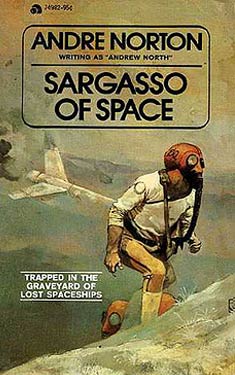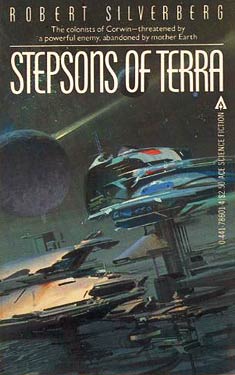GMRC Review: The Best of Frederik Pohl Edited by Lester Del Rey
 Chris Uhl (chuhl) can’t remember a time when he wasn’t a science fiction fan. He has a B.A. in Classics from Vassar College and an M.A. in English Literature from the University of Virginia. He has worked as a teacher, a legal assistant, a college development officer, a salesman, and a film extra. Chris may be the only WWEnd reviewer who has no blog. This is his fifth GMRC review to feature in the WWEnd blog and completes his challenge!
Chris Uhl (chuhl) can’t remember a time when he wasn’t a science fiction fan. He has a B.A. in Classics from Vassar College and an M.A. in English Literature from the University of Virginia. He has worked as a teacher, a legal assistant, a college development officer, a salesman, and a film extra. Chris may be the only WWEnd reviewer who has no blog. This is his fifth GMRC review to feature in the WWEnd blog and completes his challenge!
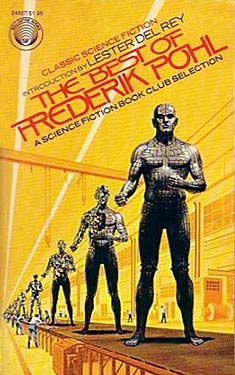 The Best of Frederik Pohl, edited by Lester Del Rey, collects nineteen stories written during the first half century of Pohl’s life.
The Best of Frederik Pohl, edited by Lester Del Rey, collects nineteen stories written during the first half century of Pohl’s life.
Tunnel Under the World – Why does Guy Burckhardt keep living June 15th over and over again? Pohl mixes one of his favorite themes, the use and abuse of advertising, with Cold War paranoia and keeps ratcheting up the tension until the triple-twisting climax. One of the best stories in the collection.
Punch – A quick little story about an alien who comes to earth and freely offers technological, medical, and financial secrets that propel humanity into a new golden age. But what’s in it for him? Like many of the stories in this collection, the real point of the story is the shocking twist at the end. It works well here, but sometimes you get the impression that the story exists just to set up the twist, and the tale is wagging the dog.
Three Portraits and a Prayer – Pohl has a real gift for characterization, and he’s not afraid to tell this and several other stories through the viewpoint of a rather unpleasant person, in this case, an arrogant doctor. The characterization of the narrator is the main attraction here, not the plot. But I do like this line: “If gravity itself grows old and thin, so that the straggling galaxies themselves weaken as they clutch each other, it seems somehow a much lesser thing that we too should grow feeble.”
GMRC Review: Sargasso of Space by Andre Norton
 Chris Uhl (chuhl) can’t remember a time when he wasn’t a science fiction fan. He has a B.A. in Classics from Vassar College and an M.A. in English Literature from the University of Virginia. He has worked as a teacher, a legal assistant, a college development officer, a salesman, and a film extra. Chris may be the only WWEnd reviewer who has no blog. This is his fourth GMRC review to feature in the WWEnd blog.
Chris Uhl (chuhl) can’t remember a time when he wasn’t a science fiction fan. He has a B.A. in Classics from Vassar College and an M.A. in English Literature from the University of Virginia. He has worked as a teacher, a legal assistant, a college development officer, a salesman, and a film extra. Chris may be the only WWEnd reviewer who has no blog. This is his fourth GMRC review to feature in the WWEnd blog.
“WORLDS FOR SALE!
That was the startling cry that electrified Dane Thorson of the space-trader Solar Queen. It was his first trip and the cosmic auction was taking place at an isolated port of call, far out in the Milky Way.
Who’ll buy this newly-discovered planet? The data on it sealed — you may be getting a radioactive desert, you may be buying a fabulous empire, or you may be stuck with an untracked unconquerable jungle. And Dane and his fellow spacemen took the risk. They bought a planet, sight unseen, whose ominous name was… Limbo!”
If you can resist a blurb like that, you’re made of sterner stuff than I am. I read that page in my used book store and snapped up Sargasso of Space right away.
The hero of the story is Dane Thorsen, an apprentice cargo-master about to receive his first assignment in space. In a scene oddly prescient of the Sorting Hat scenes in Harry Potter, Dane and his classmates wait anxiously while a computer called “The Psycho” assigns them to a ship based on their compatibility with the current crews. Dane draws the Solar Queen, a Free Trader, which means an uncertain career of high risk and potentially high rewards – or poverty.
GMRC Review: Stepsons of Terra by Robert Silverberg
 Chris Uhl (chuhl) can’t remember a time when he wasn’t a science fiction fan. He has a B.A. in Classics from Vassar College and an M.A. in English Literature from the University of Virginia. He has worked as a teacher, a legal assistant, a college development officer, a salesman, and a film extra. Chris may be the only WWEnd reviewer who has no blog. This is his third GMRC review to feature in the WWEnd blog.
Chris Uhl (chuhl) can’t remember a time when he wasn’t a science fiction fan. He has a B.A. in Classics from Vassar College and an M.A. in English Literature from the University of Virginia. He has worked as a teacher, a legal assistant, a college development officer, a salesman, and a film extra. Chris may be the only WWEnd reviewer who has no blog. This is his third GMRC review to feature in the WWEnd blog.
Stepsons of Terra is the story of Baird Ewing, a man on a mission to save his planet. His homeworld, a distant colony of Earth, lies in the path of implacable alien invaders. He travels to Earth, the first of his people to do so in 500 years, to get help, but he is shocked to find that Earthmen are not the resourceful supermen he was expecting. Instead they are weak, decadent and about to succumb to invasion themselves at the hands of the Sirians.
Like one of Alfred Hitchcock’s heroes, Ewing runs afoul of the Sirians, who refuse to believe the simple truth that he has come to enlist Earth’s help. They jump to the wrong conclusion and assume that Ewing has come to lead a revolution to save Earth so they harass, kidnap, and torture him.
In his introduction, Silverberg says that this novel, his sixth, is the first one in which “I was a trifle less flamboyant about making use of the pulp-magazine clichés [such as] feudal overlords swaggering about the stars. Rather, I would write a straightforward science fiction novel, strongly plotted but not unduly weighted towards breathless adventure.”
GMRC Review: The Legion of Space by Jack Williamson
 Chris Uhl (chuhl) can’t remember a time when he wasn’t a science fiction fan. He has a B.A. in Classics from Vassar College and an M.A. in English Literature from the University of Virginia. He has worked as a teacher, a legal assistant, a college development officer, a salesman, and a film extra. Chris may be the only WWEnd reviewer who has no blog. This is his first GMRC review to feature in the WWEnd blog.
Chris Uhl (chuhl) can’t remember a time when he wasn’t a science fiction fan. He has a B.A. in Classics from Vassar College and an M.A. in English Literature from the University of Virginia. He has worked as a teacher, a legal assistant, a college development officer, a salesman, and a film extra. Chris may be the only WWEnd reviewer who has no blog. This is his first GMRC review to feature in the WWEnd blog.
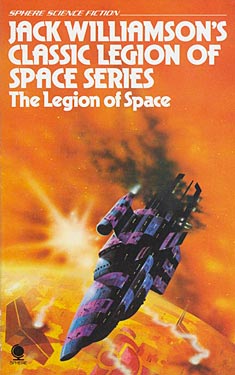 I’m a big fan of space opera, but I’ve never read E. E. “Doc” Smith or Jack Williamson because I’ve always heard that, although their importance in the genre’s history is undeniable, their prose style is an ordeal for modern readers. So I took advantage of the GMRC to try Williamson’s The Legion of Space.
I’m a big fan of space opera, but I’ve never read E. E. “Doc” Smith or Jack Williamson because I’ve always heard that, although their importance in the genre’s history is undeniable, their prose style is an ordeal for modern readers. So I took advantage of the GMRC to try Williamson’s The Legion of Space.
Yes, the prose does tend towards the purple end of the spectrum. It’s formal and intense and rather melodramatic by our standards. But if you‘re willing to give it a chance, you find yourself in the hands of an author who’s clearly having fun trying to dazzle and horrify you with the wonders and terrors that our heroes face in their quest to save the solar system from destruction. It’s like when someone tells you a ghost story around a fire. You can roll your eyes and hang on tight to your disbelief and sneer, or you can get into the spirit of the occasion and have fun with it. If you meet him halfway, Williamson’s writing can be very vivid and suspenseful and powerful.
For example, here’s an excerpt in which our four heroes, having crash-landed on a hostile planet, find themselves adrift on a log that isn’t as safe as it first appeared. At the other end of the log they see a slimy creature that looks like “a gigantic amoeba”:
GMRC Review: Divide and Rule by L. Sprague de Camp
 Chris Uhl (chuhl) can’t remember a time when he wasn’t a science fiction fan. He has a B.A. in Classics from Vassar College and an M.A. in English Literature from the University of Virginia. He has worked as a teacher, a legal assistant, a college development officer, a salesman, and a film extra. Chris may be the only WWEnd reviewer who has no blog. This is his first GMRC review to feature in the WWEnd blog.
Chris Uhl (chuhl) can’t remember a time when he wasn’t a science fiction fan. He has a B.A. in Classics from Vassar College and an M.A. in English Literature from the University of Virginia. He has worked as a teacher, a legal assistant, a college development officer, a salesman, and a film extra. Chris may be the only WWEnd reviewer who has no blog. This is his first GMRC review to feature in the WWEnd blog.
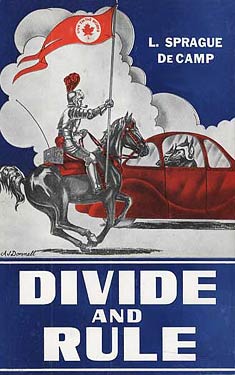 When I saw the synopsis of L. Sprague de Camp‘s Divide and Rule, I knew I had to read it. It takes place in the 23rd century in Poughkeepsie, NY. Poughkeepsie happens to be my hometown, and during my Junior Year Abroad in England, they actually called me “the Duke of Poughkeepsie.” So this is my story.
When I saw the synopsis of L. Sprague de Camp‘s Divide and Rule, I knew I had to read it. It takes place in the 23rd century in Poughkeepsie, NY. Poughkeepsie happens to be my hometown, and during my Junior Year Abroad in England, they actually called me “the Duke of Poughkeepsie.” So this is my story.
Assuming, of course, that I survive to the 23rd century, when the Hudson Valley, like the rest of the planet, will be conquered by “hoppers,” aliens who look like oversized kangaroos. The hoppers will ban high tech and reduce America to a state of medieval feudalism. As if that weren’t bad enough, Poughkeepsie will be at war with Danbury, CT over high tolls. So it looks like I’ll have my work cut out for me.
The point of the story is the juxtaposition of the medieval and the modern. When these New Yorkers talk about the new model Ford, they’re not talking about cars, they’re talking about suits of armor. And they use 20th-century American slang to describe their chivalric adventures.
The problem for me at first was that de Camp doesn’t delve too deeply into the implications of this society beyond the bare description. It’s an interesting setup – let’s explore it! It’s fun to bandy around names like Baron Peekskill and hear about knights fighting at the Battle of Mt. Kisco, but once the novelty of medieval New York wears off – and I would think that the novelty would carry me along further than most readers – then what? The juxtaposition between the medieval and the modern loses its impact when the “modern” now seems a bit quaint to the contemporary reader.
The story starts to fall between two stools – not quite satisfying as science fiction or as historical novel – and like a knight it full armor, it has trouble getting up again.
But it does rise up, when our hero finds himself forced to kill a hopper to defend himself and a damsel in distress. In a nicely-observed description of the moment immediately afterwards, DeCamp writes:
“Sir Howard leaned on his sword, waiting for the roaring in his ears to cease. He knew that he had come as near to fainting as he ever had in his life. A few feet away lay the hopper’s head, the beady eyes staring blankly. The rest of the hopper lay at his feet, its limbs jerking slightly, pushing the sand up into little piles with its hands and feet. Blue-green blood spread out in a widening pool. A few pine needles gyrated slowly on its surface.”
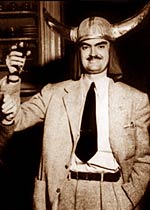 From that moment on, there’s no going back, and the story gains new power as our feckless knight-errant changes into a man with a purpose.
From that moment on, there’s no going back, and the story gains new power as our feckless knight-errant changes into a man with a purpose.
Divide and Rule is dedicated “To Bob Heinlein,” and I imagine that Heinlein must have been pleased with the offering. It’s his kind of story, with scrappy, pragmatic characters getting their political education at the hands of a didactic, Wise Old Man. But the resistance leader in this story is a gentler, more patient man than the cantankerous gurus of Heinlein.
And Sir Howard is a bit like the protagonist in a Heinlein juvenile. He’s a mature adult, but intellectually and politically he’s been kept in a state of arrested adolescence by his alien overlords. Once his consciousness is raised, though, he’s quick to make up for lost time, and so is de Camp.



















 Full Details
Full Details
